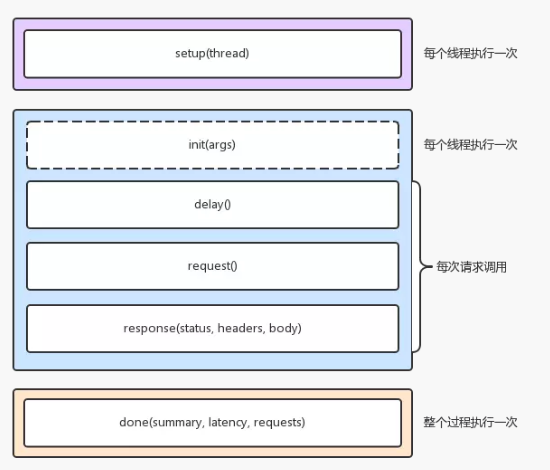wrk是一款开源的性能测试工具,支持使用lua脚本,底层封装了epoll(linux)和kqueue(bsd)。文章介绍使用wrk进行压力测试。
Quick Guide
安装
Unbuntu/Debian下的安装
1
2
3
4
5
6
7Unbuntu/Debian下的安装
sudo apt-get install build-essential libssl-dev git -y
git clone https://github.com/wg/wrk.git wrk
cd wrk
make
# 把生成的wrk移到一个PATH目录下面, 比如
sudo cp wrk /usr/local/binUnbuntu/Debian下的安装
1
2
3
4
5
6
7
8sudo yum groupinstall 'Development Tools'
sudo yum install openssl-devel
sudo yum install git
git clone https://github.com/wg/wrk.git wrk
cd wrk
make
# 把生成的wrk移到一个PATH目录下面, 比如
sudo cp wrk /usr/local/bin
命令行参数
1 | 使用方法: wrk <选项> <被测HTTP服务的URL> |

- Latency:响应时间
- Req/Sec:每个线程每秒钟的完成的请求数
- Avg:平均
- Max:最大
- Stdev:标准差
- +/- Stdev: 正负一个标准差占比
Lua脚本个性化
wrk支持在三个阶段对压测进行个性化,分别是启动阶段、运行阶段和结束阶段。每个测试线程,都拥有独立的Lua运行环境。

1.启动阶段
1
2
3
4
5
6
7# 在脚本文件中实现setup方法,wrk就会在测试线程已经初始化但还没有启动的时候调用该方法。wrk会为每一个测试线程调用一次setup方法,并传入代表测试线程的对象thread作为参数。setup方法中可操作该thread对象,获取信息、存储信息、甚至关闭该线程。
function setup(thread)
-- thread提供了1个属性,3个方法
-- thread.addr 设置请求需要打到的ip
-- thread:get(name) 获取线程全局变量
-- thread:set(name, value) 设置线程全局变量
-- thread:stop() 终止线程2.运行阶段
1
2
3
4
5
6
7
8
9
10
11function init(args)
-- 每个线程仅调用1次,args 用于获取命令行中传入的参数, 例如 --env=pre
function delay()
-- 每次请求调用1次,发送下一个请求之前的延迟, 单位为ms
function request()
-- 每次请求调用1次,返回http请求
function response(status, headers, body)
-- 每次请求调用1次,返回http响应,如果没有定义该方法,那么wrk不会解析headers和body3.结束阶段
1
2
3
4
5
6
7
8
9
10
11
12
13
14
15
16
17
18
19
20
21
22# 该方法在整个测试过程中只会调用一次,可从参数给定的对象中,获取压测结果,生成定制化的测试报告。
function done(summary, latency, requests)
latency.min -- minimum value seen
latency.max -- maximum value seen
latency.mean -- average value seen
latency.stdev -- standard deviation
latency:percentile(99.0) -- 99th percentile value
latency(i) -- raw value and count
summary = {
duration = N, -- run duration in microseconds
requests = N, -- total completed requests
bytes = N, -- total bytes received
errors = {
connect = N, -- total socket connection errors
read = N, -- total socket read errors
write = N, -- total socket write errors
status = N, -- total HTTP status codes > 399
timeout = N -- total request timeouts
}
}4.样例
1
2
3
4
5
6
7
8
9
10
11
12
13
14
15
16
17
18
19
20
21
22
23
24
25
26
27
28
29
30
31
32
33local counter = 1
local threads = {}
function setup(thread)
thread:set("id", counter)
table.insert(threads, thread)
counter = counter + 1
end
function init(args)
requests = 0
responses = 0
local msg = "thread %d created"
print(msg:format(id))
end
function request()
requests = requests + 1
return wrk.request()
end
function response(status, headers, body)
responses = responses + 1
end
function done(summary, latency, requests)
for index, thread in ipairs(threads) do
local id = thread:get("id")
local requests = thread:get("requests")
local responses = thread:get("responses")
local msg = "thread %d made %d requests and got %d responses"
print(msg:format(id, requests, responses))
end
end5.自定义脚本中可访问的变量和方法
wrk: 全局变量,修改后会影响所有请求
1
2
3
4
5
6
7
8
9
10wrk = {
scheme = "http",
host = "localhost",
port = nil,
method = "GET",
path = "/",
headers = {},
body = nil,
thread = <userdata>,
}wrk.fomat:根据参数和全局变量wrk,生成整个request的string
1
2
3
4
5function wrk.format(method, path, headers, body)
-- method: http方法, 如GET/POST/DELETE 等
-- path: url的路径, 如 /index, /index?a=b&c=d
-- headers: 一个header的table
-- body: 一个http body, 字符串类型wrk.lookup:获取域名的IP和端口,返回table,例如:返回
{127.0.0.1:80}1
2
3function wrk.lookup(host, service)
-- host:一个主机名或者地址串(IPv4的点分十进制串或者IPv6的16进制串)
-- service:服务名可以是十进制的端口号,也可以是已定义的服务名称,如ftp、http等wrk.connect:判断addr是否能连接,例如:
127.0.0.1:80,返回 true 或 false1
function wrk.connect(addr)
Lua样例
压测支持HTTP pipeline的服务
1
2
3
4
5
6
7
8
9
10
11
12init = function(args)
local r = {}
r[1] = wrk.format(nil, "/?foo")
r[2] = wrk.format(nil, "/?bar")
r[3] = wrk.format(nil, "/?baz")
req = table.concat(r)
end
request = function()
return req
end认证之后获取token以进行压测
1
2
3
4
5
6
7
8
9
10
11
12
13
14token = nil
path = "/authenticate"
request = function()
return wrk.format("GET", path)
end
response = function(status, headers, body)
if not token and status == 200 then
token = headers["X-Token"]
path = "/resource"
wrk.headers["X-Token"] = token
end
end获取cookie以进行压测
1
2
3
4
5
6
7
8
9
10
11
12
13function getCookie(cookies, name)
local start = string.find(cookies, name .. "=")
if start == nil then
return nil
end
return string.sub(cookies, start + #name + 1, string.find(cookies, ";", start) - 1)
end
response = function(status, headers, body)
local token = getCookie(headers["Set-Cookie"], "token")
if token ~= nil then
wrk.headers["Cookie"] = "token=" .. token
end
end发送json
1
2
3
4
5
6
7
8
9
10
11
12request = function()
local headers = { }
headers['Content-Type'] = "application/json"
body = {
mobile={"1533899828"},
params={code=math.random(1000,9999)}
}
local cjson = require("cjson")
body_str = cjson.encode(body)
return wrk.format('POST', nil, headers, body_str)
end
More info: wrk GitHub